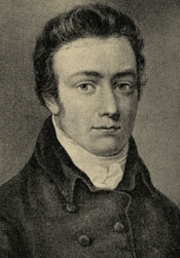On this date in 1772, the poet Samuel Taylor Coleridge was born in Devonshire, England, the youngest son of a vicar. As a youngster he was sent to a Christian boarding school in London after his father’s death. He attended Jesus College at the University of Cambridge, which he left without a degree but after having become sympathetic to Unitarianism. He dallied briefly with establishing a utopian society with poet Robert Southy to be called a “pantisocracy.”
His book Poems on Various Subjects was published in 1796. Coleridge collaborated on a volume of poetry with William Wordsworth, Lyrical Ballads in 1798. It contains his most well-known poem, “The Rime of the Ancient Mariner”: “Water, water, every where / And all the boards did shrink / Water, water, every where / Nor any drop to drink.” In the late 1790s, Coleridge, afflicted with many medical problems, apparently became addicted to opium, to which no social stigma was then attached. His poem “Kubla Khan” and narrative poem “Christabel” were composed during this period.
Coleridge became interested in Kant’s transcendentalism, studied German and translated Friedrich Schiller. He traveled to warmer climes in hopes of improving his health, taking a civil service job on Malta for a time. He lectured periodically in England for more than a decade, reviving the public’s interest in Shakespeare. He continued to write, including Biographia Literaria (1817), Aids to Reflection (1825) and Church and State (1830).
Despite his kind words for atheists (see quote below), Coleridge was probably a mild form of Deistic Unitarian. “Whenever philosophy has taken into its plan religion, it has ended in skepticism; and whenever religion excludes philosophy, or the spirit of free inquiry, it leads to willful blindness and superstition.” (Cited in Allsop’s Letters: Conversations With Recollections of Samuel Taylor Coleridge, 1836) D. 1834


